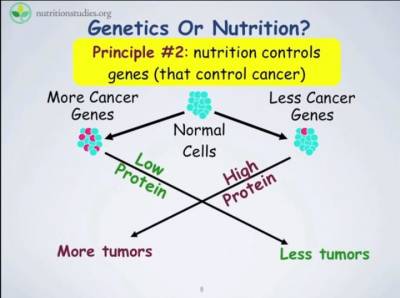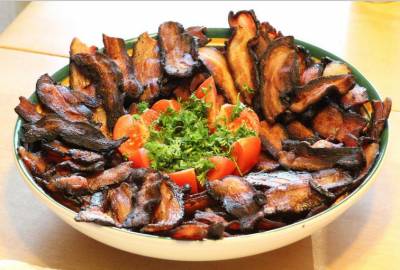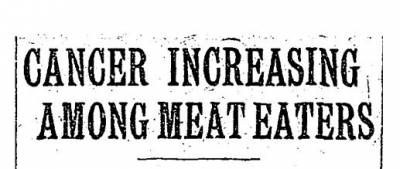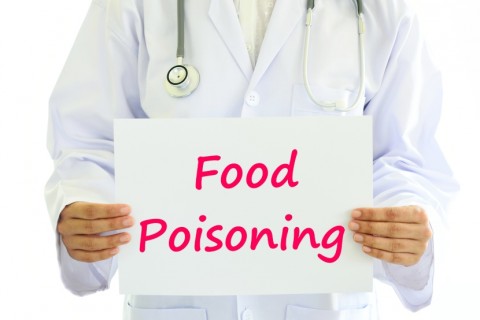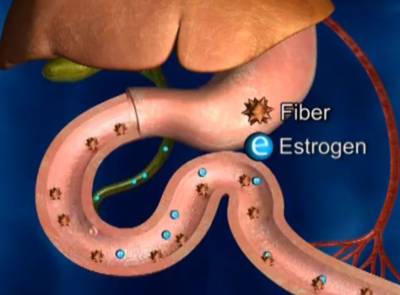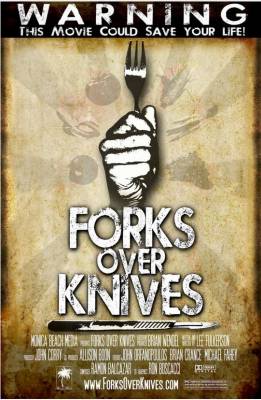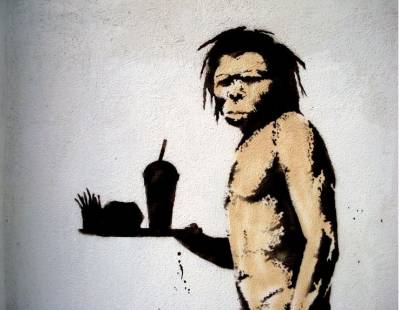This is a very powerful ten-minute video clip featuring Dr. T. Colin Campbell. He discusses how our dietary choices can either "turn on" or "turn off" cancer cell growth. Dr. Campbell's groundbreaking discovery came when he explored the relationship between nutrition and cancer while conducting a study in the 1980's in rural China called the China...
DrCarney.com Blog
High-protein, low-carbohydrate diets, such as the Atkins diet, have become very popular, but is it possible to safely lose weight on such a diet without damaging our health? Dr. Joel Fuhrman addresses this concern in his article, The Atkins Cancer Revolution, and convincingly argues: "You can lose some weight on the Atkins diet plan, but...
Studies continue to demonstrate potential health risks associated with eating animal products, as shown below - written by the Physician's Committee for Responsible Medicine. (PCRM)
"Red and processed meat products increase women's disease risk, according to a study published in the American Journal of Clinical Nutrition. Researchers from Harvard analyzed the diets and blood of 3,690 participants from the Nurses' Health Study and found that as total red meat consumption increased, C-reactive protein (CRP, a biomarker of infections and diseases including heart disease and cancer), hemoglobin A1c (an indicator of diabetes risk), and stored iron (a mineral which in excess is associated with heart disease, cancer, and diabetes) also increased. Weight and calorie intake also increased with increased intake of red and processed meat products."
"Consumption of red and processed meat products is associated with increased risk of death, according to a new review published by the American Journal of Epidemiology. Researchers looked at nine studies with years of follow-up ranging from 5.5 to 28 years to calculate a 23 percent increase in mortality risk for those consuming the most processed meat and a 29 percent increased risk for those consuming the most total red meat, compared with those who consumed the least. Other studies have shown a similar link with red and processed meat products and mortality as well as links to heart disease, cancer, and diabetes."
A team from the Nathan Pritikin Research Foundation conducted a study which took blood samples from various groups of people that ate different diets. Their blood was then dripped onto cancer cells growing in a petri dish. The results demonstrated how "...blood of those on a vegan diet was dramatically less hospitable to cancer" after just two...
Cancer is the second leading cause of death in America, taking the lives of hundreds of thousands of patients each year. Despite over 40 years of scientific research dedicated to win the war on cancer, mortality rates continue to climb. Most people understand the evidence demonstrating the correlation between meat consumption and the potential health...
The Physician's Committee for Responsible Medicine just released the results from this study under their "Breaking Medical News" column. The article states: "Diets high in saturated fats and sugar may increase your risk of death from gastrointestinal cancers, including stomach and esophageal, according to a presentation at the American Institute for Cancer Research Annual Research...
If you need a passionate, unreserved examination of facts regarding the "poisons" contained in animal foods in order to motivate you, you'll find what you're looking for in this article written by Dr. John McDougall. Dr. McDougall holds nothing back. He uses a direct approach, addressing the concerns regarding meat, dairy and eggs. Dr. McDougall...
The word "fiber" may bring many thoughts to our minds. Helping us "stay regular" would be the most prominent thought for most of us. This is certainly true; however, fiber plays a much larger role in the prevention and reversal of disease, as Dr. Neal Barnard points out in this ten minute video.
Fiber is the indigestible substance which is resistant to digestive enzymes. Its role in removing toxic waste products is an important one. Carcinogens, for example, found in meat and dairy products, are moved along more quickly when sufficient fiber is available. This shortens the time it has to damage the lining of the intestines, which helps us avoid colon cancer. This would explain one reason why colon cancer rates are much lower in those consuming a plant-based diet.
Dr. Joel Fuhrman has written an excellent article regarding our culture's obsession using rich, disease-promoting foods for celebrating special occasions, especially for Halloween. Dr. Fuhrman states in his article, "As parents we must protect our children from harm and give them the best opportunity in life to have a happy and healthy future. Science suggests...
We hope our recent blog on the Forks Over Knives documentary will encourage you and your family to watch the documentary together. The above five minute video gives a brief overview of why the film was made and the background of the scientists and doctors that were featured in the film. It's never too late...
Despite new advances in medical technology, and U.S. healthcare costs exceeding that of other countries, Americans are sicker than ever before. It's estimated that 80% of adults are overweight, and more than 70% of office visits involve prescription drug therapy.
Tens of thousands of patients die every year due to unintentional drug overdose, drug interactions, or from the side effects from these drugs. The majority of today's office visits reflect lifestyle driven diseases such as heart disease, cancer, and diabetes. Tragically, these degenerative diseases are the leading cause of death, yet can largely be prevented through dietary excellence.
The "Paleo" diet or "Caveman" diet has recently become a popular diet, especially among some fitness groups such as CrossFit. The Paleo diet is a modern day diet based on the presumed ancient diet of early man during the Paleolithic Era.
There are many aspects of this diet which are health promoting, such as the addition of fruits, vegetables, and nuts and seeds. Other beneficial attributes include the avoidance of dairy products, processed snack foods, and alcohol. However, legumes, grains, and starchy vegetables have also been eliminated which are beneficial and are a significant part of a whole-food, Starch-Smart® diet. The Paleo diet centers its meals around animal products, much like the typical American diet, and is high in saturated fat and low in carbohydrates. Advocates state that the high percentage of animal products to whole plant food is a key feature of this diet with sausage, bacon, lard and tallow being acceptable.

